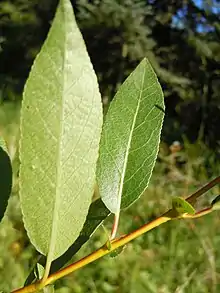Salix boothii
Salix boothii is a species of willow known by the common name Booth's willow.[1]
| Salix boothii | |
|---|---|
 | |
| Scientific classification | |
| Kingdom: | Plantae |
| Clade: | Tracheophytes |
| Clade: | Angiosperms |
| Clade: | Eudicots |
| Clade: | Rosids |
| Order: | Malpighiales |
| Family: | Salicaceae |
| Genus: | Salix |
| Species: | S. boothii |
| Binomial name | |
| Salix boothii Dorn | |
It is native to western North America from British Columbia and Alberta south to California and New Mexico.[1] It grows in moist mountain habitat, such as riverbanks.
Description
Salix boothii is a shrub that can reach 6 metres (20 ft) in height. It is larger and has more branches in well-drained soils, and takes a smaller, simpler form in saturated areas such as bogs.[2] The leaves are lance-shaped to oval with a pointed tip and smooth-edged or lightly serrated. They are up to 10 cm long when mature with a shiny top surface; new leaves are covered in shaggy white hairs.[3]
The inflorescences develop before the leaves grow, or simultaneously. Male catkins are up to about 4 cm long and female catkins are up to 7 cm. Male flowers have two stamens. Its blooming period is May and June.[4]
It reproduces sexually by seed and also vegetatively by sprouting from its stem base and root system, allowing it to produce colonies of clones.[2]
Uses
This willow forms dense colonial thickets and it can be used for erosion control in riparian zone habitats in its native range.[2] It is also tolerant of wildfire, resprouting relatively easily after aboveground parts have been burned away.[2]
References
External links
